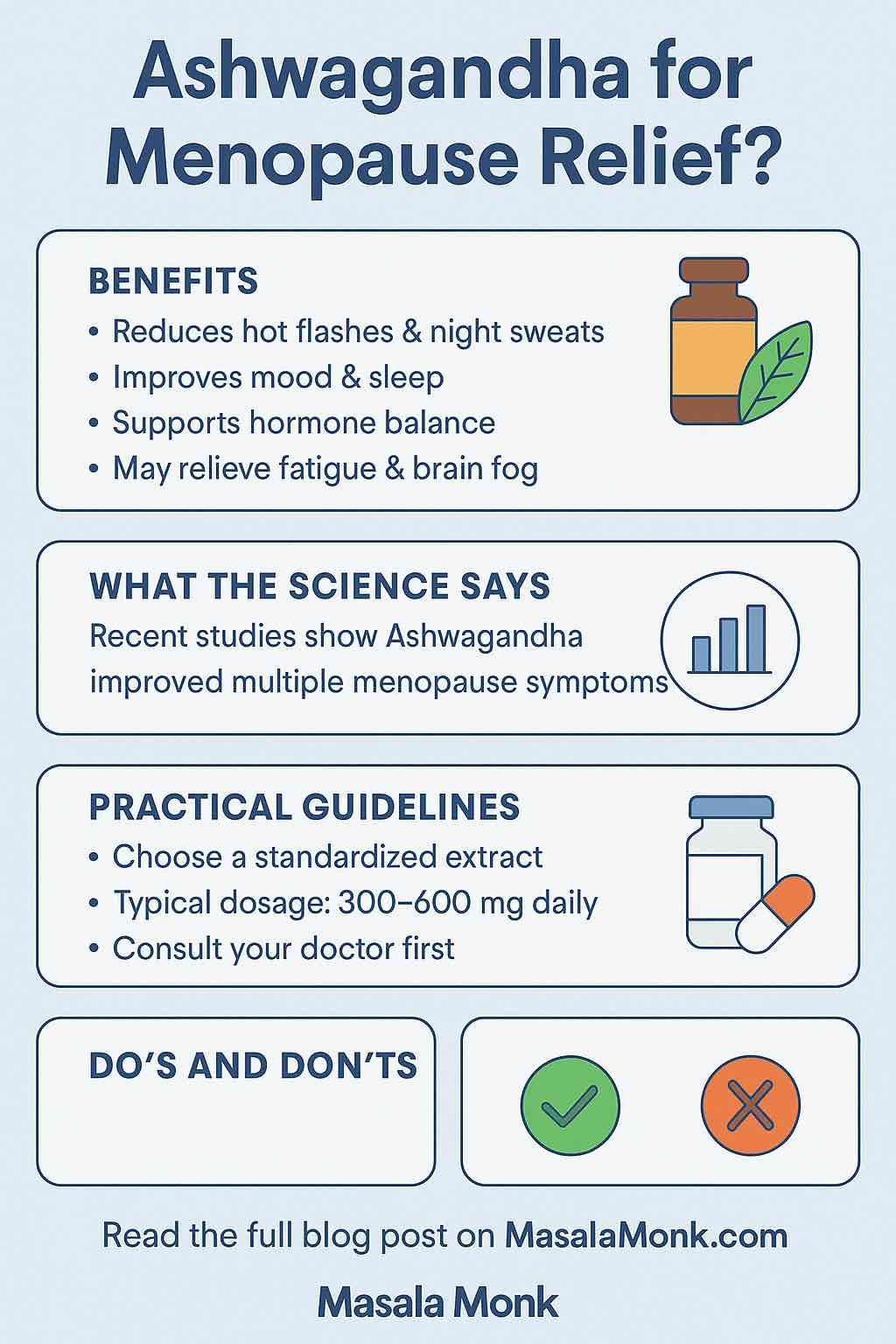
Menopause. Just the word can stir up a whole cocktail of feelings. If you’re navigating this natural transition, you know it can come with waves of hot flashes, sleepless nights, mood swings, and that infamous brain fog. While hormone replacement therapy (HRT) is a mainstream solution, many women want more natural ways to ease their symptoms—or to add gentle, supportive options alongside conventional care.
One herbal remedy that’s surging in popularity is Ashwagandha (Withania somnifera). But does the science support the hype? And—practically—how should you use it for real-world relief? Let’s dig in.
What Is Ashwagandha?
Ashwagandha, sometimes called “Indian ginseng” or “winter cherry,” is an adaptogenic herb used for centuries in Ayurvedic medicine. Adaptogens are special plants believed to help your body adapt to stress, balance hormones, and support overall resilience.
Traditionally, Ashwagandha was used for vitality, energy, and calming the mind—but modern research has put it under the microscope for all sorts of women’s health applications, menopause included.
Why Are Women Turning to Ashwagandha for Menopause?
Menopause is about more than just your period stopping. It’s a time of dramatic hormonal changes—mainly a drop in estrogen and progesterone. That hormonal turbulence can create a ripple effect across nearly every body system.
Common symptoms?
- Hot flashes
- Night sweats
- Sleep disturbances
- Mood swings and anxiety
- Low energy and fatigue
- Brain fog
- Vaginal dryness and changes in libido
It’s no surprise women seek solutions that address multiple symptoms at once. Enter Ashwagandha, which—thanks to its broad effects on stress, sleep, mood, and hormones—feels like a logical fit.
What Does the Latest Science Say?
Let’s skip the wishful thinking and look at real studies. Here’s what research in the past couple of years has uncovered:
1. Reducing Hot Flashes & Night Sweats
- A 2025 clinical trial followed over 120 postmenopausal women who took a standardized Ashwagandha extract (Sensoril®) at 250 mg or 500 mg daily for 24 weeks. The results? Both doses led to a 24% reduction in vasomotor symptoms—meaning hot flashes and night sweats got noticeably better.
- Improvements were also seen in mood, sleep, and sexual health. The higher dose had even stronger effects.
- Other smaller studies (2021–2024) echo these findings, showing a reduction in hot flashes, improved sleep, and better emotional balance.
2. Mood, Anxiety, and Sleep
- Ashwagandha’s claim to fame is as a stress-buster. Several studies show that doses around 300–600 mg per day can reduce anxiety, help you cope with stress, and even support better, deeper sleep.
- One trial found women felt calmer and less irritable within just a few weeks. Many participants reported better sleep quality and fewer middle-of-the-night wake-ups.
3. Hormonal Support
- Some studies (including recent ones) found that Ashwagandha can raise estrogen levels and decrease FSH/LH, the hormones that spike as your ovaries slow down. While not a replacement for HRT, this hormonal balancing act might explain the improvement in hot flashes, mood, and even vaginal dryness.
- There’s also emerging evidence of benefits for bone and cardiovascular health, likely tied to both direct effects and overall lower inflammation.
How Does Ashwagandha Work?
- Lowers Cortisol: Chronic stress makes menopause symptoms worse. Ashwagandha helps calm your HPA axis, dialing down the body’s stress response.
- Supports Neurotransmitters: It may increase GABA activity (think: calm, relaxed brain) and help stabilize mood.
- Mildly Mimics Estrogen: Some evidence suggests it interacts with hormone receptors, potentially offsetting drops in estrogen.
- Reduces Inflammation: By fighting oxidative stress, Ashwagandha may support everything from brain function to heart health.
Practical Guide: How to Use Ashwagandha for Menopause
1. Choose a Quality Extract
Look for standardized extracts—such as Sensoril® or KSM‑66—since these are used in clinical trials. Check for third-party certification (like NSF or USP) and a standardized withanolide content (5–10%).
2. Start With the Right Dose
- Most studies used 300–600 mg per day, split into two doses with meals.
- Start low (300 mg) to see how your body responds, then increase if needed.
- Give it at least 8 weeks to gauge benefits—most changes are gradual.
3. Who Should Avoid It?
- Ashwagandha is generally safe, but do not use it if you are pregnant, breastfeeding, or have known liver disease or autoimmune conditions.
- Check with your doctor if you take thyroid meds, sedatives, or have a history of hormone-sensitive cancers.
- Side effects are usually mild (drowsiness, digestive upset), but rare cases of liver irritation have been reported—so always use reputable brands.
4. Track Your Symptoms
Keep a menopause journal or use an app to log:
- Number and intensity of hot flashes/night sweats
- Sleep quality
- Mood/anxiety
- Vaginal symptoms and libido
Compare your baseline with how you feel after 4, 8, and 12 weeks.
Do’s and Don’ts for Real-Life Success
DO:
- Be patient! Natural remedies take time—expect 4–8 weeks for the first noticeable results.
- Combine Ashwagandha with lifestyle basics: regular exercise, balanced nutrition, stress management, and good sleep hygiene.
- Use the same standardized brand for consistency.
DON’T:
- Don’t exceed recommended doses, thinking “more is better.”
- Don’t use it as a substitute for urgently needed medical care or HRT if prescribed.
- Don’t ignore unusual symptoms—stop and consult a healthcare professional if you notice jaundice, severe fatigue, or abdominal pain.
What Real Women Are Saying
Many women describe feeling “steadier,” less frazzled, and more like themselves after starting Ashwagandha. Hot flashes ease up, and restless nights become a little less torturous. Some even note a boost in libido or comfort with sex.
But remember—every woman’s journey is different. If you try Ashwagandha and it’s not for you, that’s okay! Menopause is highly individual, and so is the best way to manage it.
Final Thoughts
Ashwagandha isn’t a magic cure—but modern research shows it’s a genuine, gentle ally for women facing menopause. By easing hot flashes, smoothing mood swings, improving sleep, and supporting hormonal health, it helps make this transition more manageable. Combine it with lifestyle self-care and the support of your health team for best results.
If you’re ready to try Ashwagandha, invest in a quality, standardized extract, track your symptoms, and give it a fair chance. As always, personalized advice from a healthcare provider is gold.
Menopause is a journey—sometimes bumpy, sometimes empowering. Whether Ashwagandha becomes part of your toolkit or not, know that support, science, and self-compassion can make all the difference.
10 FAQs About Ashwagandha for Menopause Relief
1. How long does it take for Ashwagandha to work for menopause symptoms?
Most women begin to notice benefits—such as reduced hot flashes, improved sleep, and a calmer mood—within 4 to 8 weeks of daily use. For full results, try it consistently for at least 12 weeks.
2. What is the recommended dosage of Ashwagandha for menopause relief?
Clinical studies commonly use 300–600 mg per day of a standardized extract, split into two doses (morning and evening). Always check the label for withanolide content and use the same brand for consistency.
3. Is Ashwagandha safe to use with hormone replacement therapy (HRT) or other medications?
Generally, yes, but always check with your healthcare provider. Ashwagandha can interact with sedatives, thyroid medications, and some immune-modulating drugs. Never combine supplements and prescription meds without professional advice.
4. Are there any side effects of Ashwagandha?
Most people tolerate Ashwagandha well. Occasional side effects include mild digestive upset, drowsiness, or headache. Rarely, liver issues have been reported—avoid if you have liver disease or unexplained jaundice.
5. Which is better: Ashwagandha powder or extract?
For menopause symptom relief, standardized extracts (such as KSM-66 or Sensoril) are preferred, as these are used in clinical research and provide consistent, measurable doses of active compounds.
6. Can Ashwagandha help with all menopause symptoms?
It’s most effective for stress, sleep disturbances, mood swings, and hot flashes. Some evidence suggests benefits for sexual health, bone health, and cognitive clarity, but effects may vary.
7. Should Ashwagandha be taken in the morning or at night?
Most studies use a split dose—half in the morning, half in the evening, with food. If you experience drowsiness, take the larger dose in the evening.
8. Is Ashwagandha suitable for everyone?
No. Avoid if pregnant, breastfeeding, or if you have autoimmune disorders, hormone-sensitive cancers, or active liver problems. Always consult a healthcare professional if unsure.
9. Can I take Ashwagandha long-term?
Short-term studies (up to 6 months) show good safety, but there’s limited data on continuous use beyond a year. If you plan to use it long-term, take periodic breaks and check in with your doctor.
10. How do I know if Ashwagandha is working for me?
Track your symptoms using a menopause journal or app. Look for changes in hot flashes, sleep, mood, energy, and overall well-being after 4–8 weeks. If you see little or no benefit after 12 weeks, consult your provider about other options.










